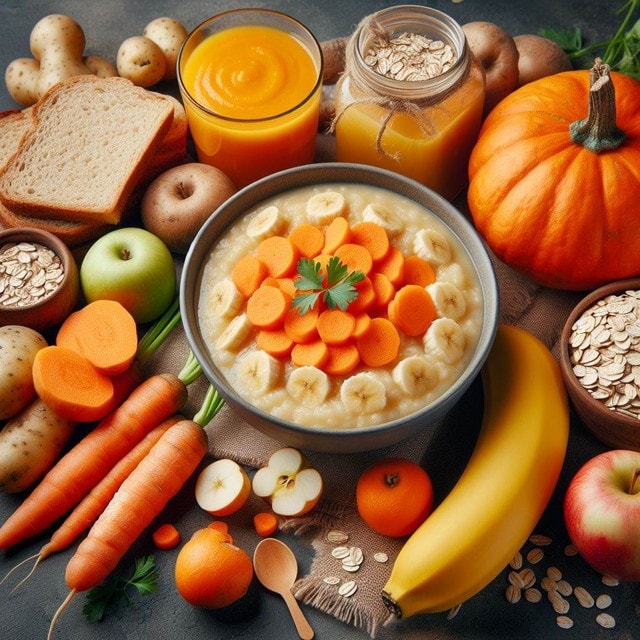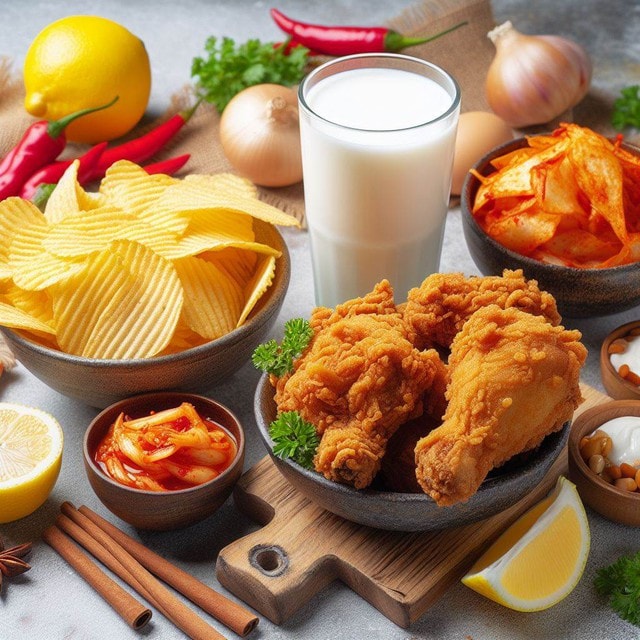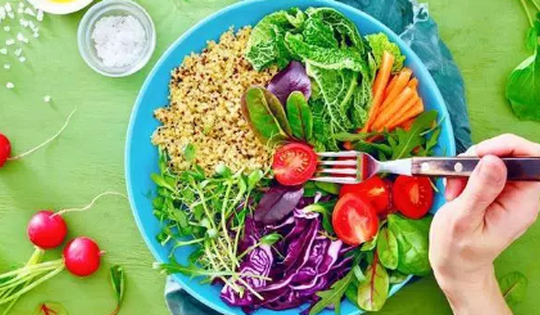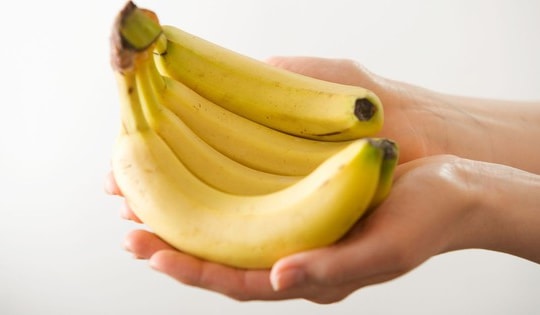Diet for people with diarrhea
When having diarrhea, the body often loses water and electrolytes, so following a proper diet is essential to improve resistance and reduce fatigue.
1. The importance of diet for people with diarrhea
Diarrhea is a common digestive disorder, caused by many factors such as viral, bacterial, parasitic infections, food poisoning or side effects of drugs...
When having diarrhea, the body will lose a lot of water and electrolytes, leading to fatigue and weakness. Therefore, applying a reasonable diet plays an important role in supporting, shortening the treatment time, helping the body recover quickly.
Here are some reasons why diet is important when you have diarrhea:
Rehydration and electrolytes:Diarrhea causes the body to lose a significant amount of water and electrolytes, leading to dehydration and electrolyte imbalance. A suitable diet provides enough water and electrolytes to compensate for the loss, helping the body restore balance. Nutritional supply: When having diarrhea, the body still needs to be provided with adequate nutrition to maintain its activities and support the recovery process. At this time, the digestive system is weak, so it is necessary to choose foods that are easy to digest and absorb.
Support the digestive system:Certain foods that help the digestive system during diarrhea, such as foods containing probiotics and foods rich in soluble fiber, help reduce diarrhea. A diarrhea diet can help reduce sudden, severe diarrhea in people with chronic (persistent) conditions such as irritable bowel syndrome (IBS), inflammatory bowel disease (IBD), and celiac disease.
2. Essential nutrients for diarrhea

When you have diarrhea, your body loses a lot of water, electrolytes and nutrients. Therefore, it is important to replenish essential nutrients to help your body recover quickly.
Here are some essential nutrients for people with diarrhea:
Water and electrolytes:Diarrhea can lead to significant dehydration, causing the body to become dehydrated. Water and electrolytes are essential substances to help replenish the water and electrolytes lost due to repeated diarrhea. Filtered water, ORS, coconut water, diluted fruit juice... are good choices to replenish water and electrolytes.
Soluble fiber:People with diarrhea should eat less fiber but should supplement soluble fiber because they have the ability to absorb fluid, helping to reduce diarrhea. Foods rich in soluble fiber include: apples, bananas (ripe), boiled potatoes, white rice, tapioca flour, barley, oatmeal, products made from white flour...
Potassium:Potassium is an important mineral that helps regulate blood pressure, heart and muscle function. Potassium is found in bananas, sweet potatoes, spinach, lentils...
Sodium:Sodium is also an important mineral that helps regulate blood pressure and balance fluids in the body. Sodium is abundant in table salt, soup, cold cuts, canned fish, etc.
Zinc:Zinc helps strengthen the immune system and supports the wound healing process. Zinc is abundant in beef, chicken, oysters, beans, etc.
Vitamin A:Vitamin A helps strengthen the immune system and protect the intestinal mucosa. Vitamin A is abundant in carrots, sweet potatoes, liver, eggs...
Vitamin C:Vitamin C strengthens the immune system and aids in wound healing. Vitamin C is abundant in oranges, tangerines, grapefruit, bell peppers...
Probiotics:Gut flora plays an important role in maintaining digestive health. Probiotic foods help the gut recover after a diarrheal infection. The live bacteria in probiotics help restore the beneficial gut bacteria needed to maintain a healthy gut flora. Yogurt or kefir, a fermented milk drink, are good options, although these are dairy products, which are not generally suitable for diarrhea. (Just make sure the yogurt or kefir is low in sugar.)
In addition, people with diarrhea also need to supplement other nutrient groups such as protein, carbohydrates and fat.
However, it should be noted that the diet for people with diarrhea needs to be adjusted depending on the condition, age and health of each person. You should consult a doctor or nutritionist for the most suitable diet.
3. Foods to eat and avoid when you have diarrhea
3.1 Foods to eat

To supplement nutrition, people with diarrhea need to eat nutritious foods, processed in liquid, soft, easy-to-digest form to help patients digest easily, absorb easily and not irritate the digestive tract mucosa.
Banana:Unripe bananas are high in starch, which helps draw moisture out of the stool, helping to firm it up and reduce diarrhea symptoms. Bananas are also rich in potassium, an important electrolyte that people with diarrhea are losing.
Carrot:Mild diarrhea can use carrots, because carrots have the property of absorbing mucus, reducing intestinal motility, making intestinal motility return to normal.
Potato:Potatoes without skin are easy to digest and contain potassium, an electrolyte lost during diarrhea.
Pumpkin:Pumpkin meat is rich in soluble fiber, improves constipation, diarrhea, and helps improve digestive function. Soluble fiber retains water in the digestive tract, forming a gel that promotes better and more complete bowel movements.
Oatmeal:Oats are a good source of fuel for healthy bacteria in the gut, rich in soluble fiber which can help reduce the risk of digestive symptoms, potentially reducing the risk of inflammation…
White rice:White rice is low in fiber and is easier to digest than high-fiber grains such as brown rice and other whole grains. You can cook salt porridge, sugar porridge, chicken porridge, pork porridge, carrots, potatoes, pumpkin.
Apple sauce:Unlike whole apples, applesauce is broken down into an easily digestible form, making it a good choice for people with diarrhea.
Crispy cookies:Crackers made from white flour or gluten-free, low-fiber flour are easy to digest and help soothe the stomach.
Broth and soup:Soups and broths that are low in fat and fiber are hydrating and contain nutrients that can be lost in loose stools, such as sodium. Examples include chicken (chicken breast), lean pork, carrot, potato, and pumpkin soups.
Yogurt:Yogurt contains probiotics that help support intestinal microflora, good for the digestive system.
Coconut water:Coconut water is an electrolyte-rich drink that helps replace fluids and electrolytes lost due to diarrhea.
3. 2 Foods to avoid

Eat the right foods when you have diarrhea and stay away from foods that make the situation worse, for example the following foods:
Spicy foods:Spicy foods can irritate the stomach, increasing diarrhea.
Fried foods with lots of oil:Greasy foods are difficult to digest and can make diarrhea worse.
Raw or undercooked food:Raw or undercooked foods may contain disease-causing bacteria, increasing the risk of food poisoning.
Milk and dairy products:Milk and dairy products may aggravate diarrhea in some people.
Stimulant:Stimulants such as alcohol, beer, coffee, carbonated soft drinks, etc. stimulate the stomach and increase diarrhea.
Foods high in fiber:High-fiber foods can increase bowel movements, making diarrhea worse.
Sweets:Sweets can spike blood sugar levels, leading to diarrhea.
In addition, people with diarrhea should also limit eating foods that are difficult to digest, cause bloating, irritate the stomach, and increase diarrhea such as beef, peanuts, onions, garlic, cabbage, cauliflower...
By adopting a reasonable diet and following the notes, people with diarrhea can quickly recover their health. Diarrhea usually occurs in a short time, but if this condition continues despite adjusting the diet, taking anti-diarrheal drugs and having serious symptoms such as high fever, severe abdominal pain, vomiting... you need to go to the hospital immediately for timely treatment.
People with diarrhea should note the following:
Drink plenty of water, including filtered water, ORS, diluted fruit juice, etc. Divide your meals into smaller portions and eat many meals a day. Eat soft, easy-to-digest foods. Limit spicy, greasy, and high-fiber foods. Practice food hygiene and safety, eat cooked food and drink boiled water. Get enough rest and avoid strenuous exercise./.



